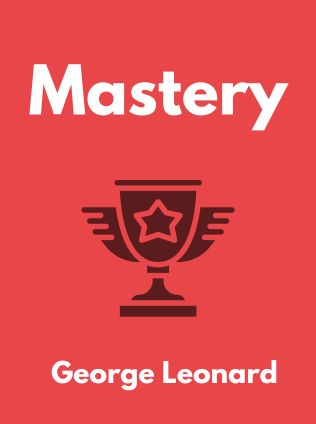
Mastery
The Keys to Success and Long-Term Fulfillment
By George Leonard
Published 02/1992
About the Author
George Leonard, a leading figure in the human potential movement, is renowned for his deep insights into personal development and mastery. His career spans more than a decade of writing and teaching, with notable works including "The Life We Are Given" and "The Way of Aikido." Leonard's contributions to the fields of psychology and self-improvement have been recognized widely, earning him the title of "the poet-philosopher of American health." His background in aikido, a Japanese martial art, deeply informs his philosophy, emphasizing the integration of mind and body. As the founder of Leonard Energy Training, Leonard has worked with thousands of individuals, helping them unlock their potential through a holistic approach to personal growth.
Main Idea
In "Mastery: The Keys to Success and Long-Term Fulfillment," George Leonard presents a compelling argument that mastery is not an end goal but an ongoing journey. He challenges the prevalent cultural obsession with quick fixes and instant gratification, advocating instead for a committed, lifelong pursuit of learning and self-improvement. Leonard's philosophy is rooted in the belief that anyone can achieve mastery, regardless of their initial skill level, as long as they are willing to embrace the process and endure the inevitable plateaus. The book outlines the essential principles and tools needed to cultivate a mindset conducive to mastery, offering practical advice for navigating the challenges and rewards of this journey.
Table of Contents
- Introduction
- What is Mastery?
- Mastering the Basics
- The Enemies of Mastery
- A Look at the Five Master Keys
- More Tools for the Journey
- Exercising the Body and the Mind
- The Appeal of Mastery
What is Mastery?
Leonard begins by exploring the concept of mastery, which he describes as both an art and a science. Mastery, according to Leonard, is not simply about achieving perfection in a particular skill or field; it is about embarking on a journey of continuous improvement. He asserts that mastery is characterized by a willingness to embrace the process of learning, which includes periods of rapid progress as well as plateaus where growth seems to stagnate. Leonard uses the analogy of learning to play tennis to illustrate this concept, highlighting how initial enthusiasm can wane when faced with the realities of sustained practice and the plateau effect.
"There's really no way around it," Leonard writes. "Learning any new skill involves relatively brief spurts of progress, each of which is followed by a slight decline to a plateau somewhat higher in most cases than that which preceded it." - George Leonard
Leonard emphasizes that the plateau is a natural part of the learning process and should not be seen as a failure. Instead, it is a period where the skills acquired during the initial learning phase are solidified and internalized. This period of consolidation is crucial for achieving true mastery, as it allows individuals to build a strong foundation upon which further skills can be developed. Leonard's perspective is that true mastery involves embracing these plateaus and understanding that progress often comes in waves, with each plateau serving as a stepping stone to greater levels of achievement.
Sign up for FREE and get access to 1,400+ books summaries.
You May Also Like
The Subtle Art of Not Giving a F*ck
A Counterintuitive Approach to Living a Good Life
By Mark MansonRich Dad Poor Dad
What the Rich Teach Their Kids About Money - That the Poor and Middle Class Do Not!
By Robert T. KiyosakiHow To Win Friends and Influence People
The All-Time Classic Manual Of People Skills
By Dale CarnegieFreakonomics
A Rogue Economist Explores the Hidden Side of Everything
By Steven D. Levitt and Stephen J. Dubner



















